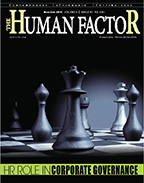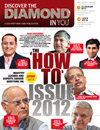P. DWARKANATH GROUP DIRECTOR - HUMAN CAPITAL, MAX INDIA Match, Hatch and Dispatch P. Dwarkanath (Group Director - Human Capital, Max India) explains why verification becomes important Issue Date - 01/03/2013 |
 Q. What is so challenging or complex about recruitment process? Q. What is so challenging or complex about recruitment process?A. One of the significant KRA of any good HR professional is the right kind of hiring. So, it is imperative that selection and recruitment become a significant process. Unfortunately, post liberalisation, where we opened up and started having different sectors especially IT, we have gone for mass recruitment, whereby the quality of hiring has got diluted down the years. And I believe if the right person is not hired, the cost of re-hiring is far more significant apart from low morale, low productivity, loss of business opportunities and so on. Right hiring is important and is a sign of a good manager and the approach should be to get the best hire. The three most important aspects of talent acquisition are getting the right hire, nurturing and developing it and then matching its expectation and the gross development. This is what makes selection and recruitment a significant process in an enterprise. There are three important things that I always say for what an HR personnel does: he does hatch, match and dispatch; which is to say that the HR hires a person, matches with the organisation’s expectations and requirements and dispatches the employee as moving on to another company or by retirement. Q. How has the process of selection and recruitment evolved since the time you started your career? A. I have spent 42 years in this industry. The time I was recruited as a senior management trainee, it would be a matter of pride on getting selected there because it was much more rigorous and meticulous and had the crème de la crème. Earlier the entire selection process comprised screening, preliminary interview, group discussion, psychological test and reference-check interview. Q. Share one important aspect that you have realised down the years. A. One lesson that I have learnt early on is that every stage of selection is crucial, even screening. Hiring is an intensive process, which should be based on quantitative hiring, but should be a qualitative process-oriented practice. Recruitment should be seen as an investment and not a cost. Knowledge and capability can always be assessed but what is most important is cultural fit. These days hiring is outsourced to consultants who can judge the basics but are unable to understand the company’s culture, and hence unable to decide whether the candidate matches the organisational culture or not. So, knowledge, skill and competency should be measured first and then when two prospective employees are at par with each other in this context, cultural fit should be evaluated. However, no hiring is foolproof because at the end of the day it is a person’s judgement and any judgement is subject to many factors. But if a systematic, transparent, organised and objective method is followed, this subjectivity can be reduced to a great extent. |
 Q. What are some of the dos and don’ts that HR should follow while recruiting? Q. What are some of the dos and don’ts that HR should follow while recruiting?A. One important aspect of recruitment is giving a clear picture to the potential employees about things such as the kind of job they are opting for, the designation, the role, how they fit in the hierarchy, who they will be reporting to and the compensation; there should not be any surprises in store for them. It is wrong to give misleading information during the interview stage; it shows the organisation in a bad light when the employees later realise the actual scenario. It is always better to be upfront and not to give rise to undue expectations. The HR is expected to be fair and objective. We at times do not value the time of the candidates. The senior management thinks that since the person has come here for a job, let him wait and then half of the senior management do not meet easily — this entire practice is wrong. Similarly, at times it is so sweet and honey coated during the interview and post hiring that the employees become indifferent. HR is not a role to be played in isolation, even line managers are equally important because it is ultimately they who the candidate has to work with and only they know the intricacies of a requirement. Q. What about the employees, what can be expected from them? A. It should be the same when it comes to an employee. It is sometimes seen that at times during the selection procedure the candidates display a lot of respect for HR, and once they are taken in, they do not even bother to look back. There is an HR joke regarding this– once a guy dies and goes up, he is asked whether he wanted to go to hell or to heaven. To this he says he wants to see both. He is shown that in hell everyone is partying and enjoying, whereas in heaven it is peaceful and boring. So, he opts for hell, later realising that people there have to labour hard, while the opposite was true for heaven. On inquiring he is told that it was his induction the day before, while today is the reality. Q. We can expect HR not to be prejudiced or to play favourites, but can such fairness be expected from a line manager as well? A. In one of my previous companies, once a sales director wanted to hire and we presented two candidates while recommending only one of them. Both were at par when it came to skills and knowledge, but the difference was in attitude. Despite our advice, our sales director overruled the suggestion and recruited the one with a casual attitude, but was forced to ask him to leave within three months. He acknowledged his mistake and admitted that he had made a wrong choice. Hence, it is a collective effort of the HR and the line manager. |



